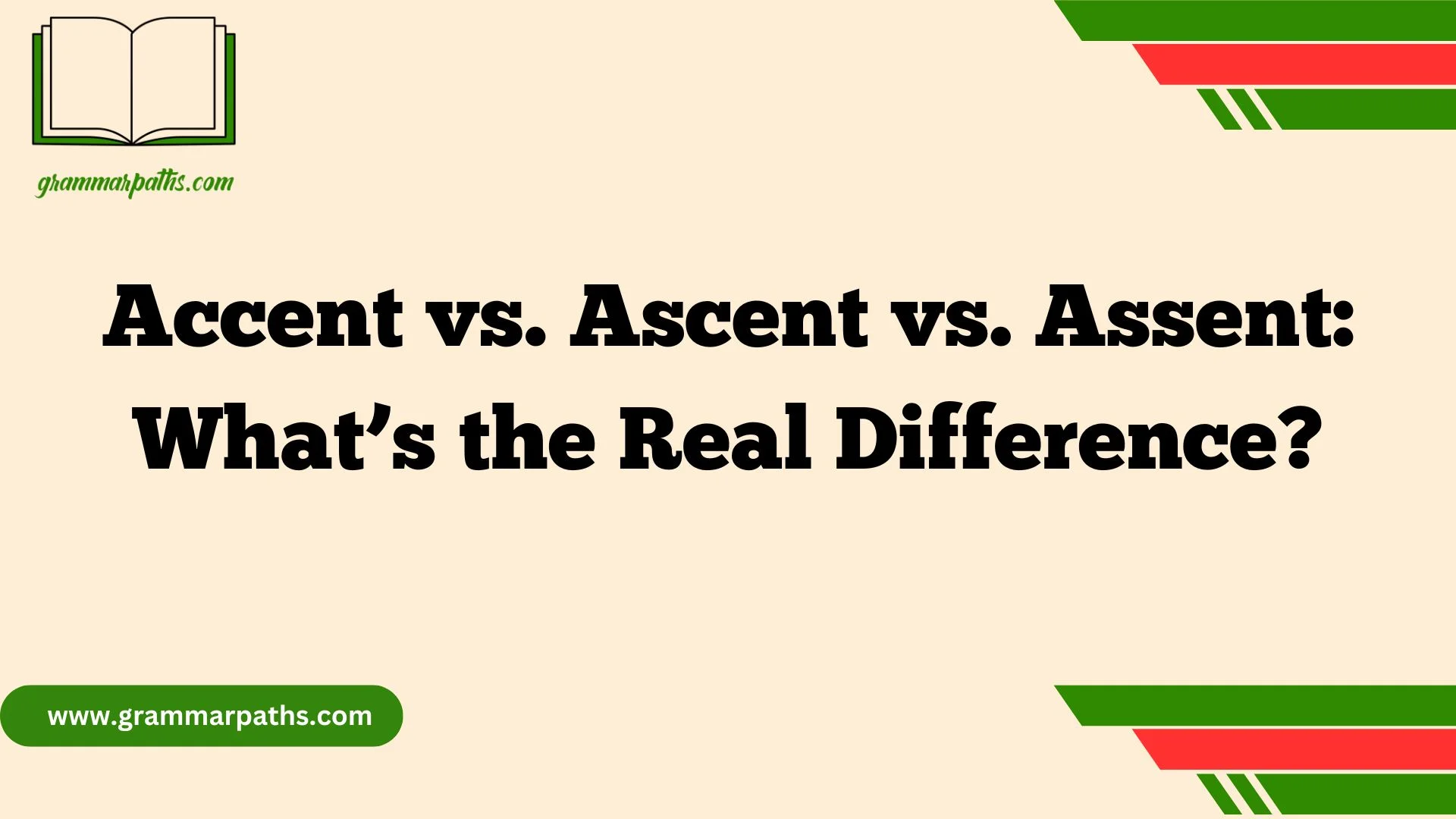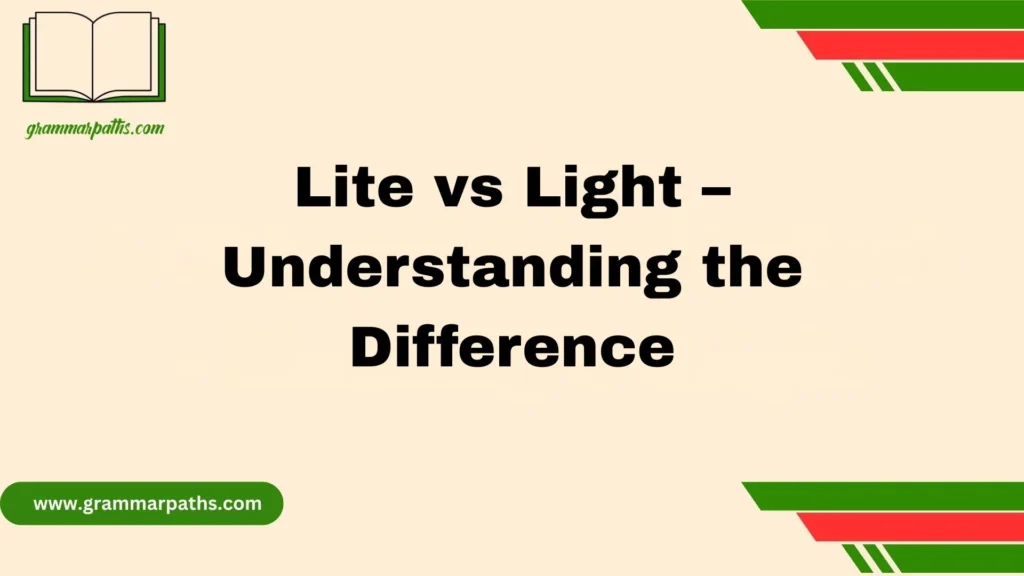In the vast landscape of the English language, it’s easy to get tangled in homophones—words that sound the same but differ in spelling and meaning. Three of the most commonly confused words in this category are accent, ascent, and assent. Despite sounding alike, each has its own distinct definition, usage, and contextual meaning. Understanding these differences is crucial for effective communication, especially for learners of English, writers, and public speakers. Whether you’re writing a formal essay, giving a speech, or participating in a debate, misusing these terms can lead to misunderstandings or even grammatical errors. Many people search for help with “accent vs. ascent usage” or “assent meaning in law or agreement”, seeking clarity on spelling, pronunciation, and examples in real-life sentences.
This guide will break down each term using comparison charts, sentence examples, and visual memory aids, making it easier to differentiate them with confidence.
Why Accent, Ascent, and Assent Confuse So Many People
English is full of homophones and near-homophones — words that sound alike but mean different things. This creates challenges, especially with words like accent, ascent, and assent, which are often mixed up in speech and writing.
Understanding the precise differences matters. For example, mixing up ascent (climbing up) with assent (agreeing) can change the meaning of a sentence entirely. Such errors are common in exams like the TOEFL, SAT, or IELTS, and can also lead to embarrassing misunderstandings in casual conversations.
This guide breaks down each word, offers examples, and provides memory hacks to help you avoid confusion.
What Is an Accent?
Definition and Grammatical Role
Accent can be both a noun and a verb. As a noun, it refers to a particular way of pronouncing words, especially related to a region or country. As a verb, it means to emphasize or stress a syllable or feature in speech or writing.
Accent as a Noun: Regional and Foreign Variations
When you hear someone speak with a British accent or an Australian accent, you’re noticing their unique pronunciation influenced by geography or culture. Accents are more than just sounds — they carry identity, history, and sometimes social perceptions.
For example:
- Her Southern accent made her speech warm and inviting.
- The French accent adds a melodic quality to English.
Accent as a Verb: Emphasizing Features
Using accent as a verb highlights something important. Writers or speakers may accent certain words or sounds to convey emotion or clarity.
Examples:
- The speaker accented the word “freedom” to inspire the audience.
- In poetry, poets accent specific syllables to maintain rhythm.
Related Terms and Phrases
- Accent mark: A diacritical symbol used in writing to indicate pronunciation or stress (é, á, ü).
- Strong accent: A noticeable or heavy pronunciation style.
- Mild accent: A subtle regional influence on pronunciation.
What Is Ascent?
Definition and Usage
Ascent is a noun that means the act of climbing or rising upward. You’ll find it in physical, metaphorical, and even social contexts.
Examples in Everyday English
- The climbers began their ascent of Mount Everest at dawn.
- Her ascent to the position of CEO was rapid and well-earned.
- The rocket’s ascent through the atmosphere was flawless.
Ascent vs. Ascend: Root Connection
The verb ascend means “to go up” or “to rise.” Ascent is the noun form referring to the actual act or process of ascending. Think of ascent as the journey, and ascend as the action.
Visual & Contextual Clues to Remember Ascent
Imagine walking up a steep staircase, climbing a mountain, or watching a balloon rise. These images link well with the idea of ascent. In business, a career ascent means moving upward in rank or status.
What Is Assent?
Definition and Part of Speech
Assent functions as both a noun and a verb, referring to an expression of approval or agreement. It is often used in formal, legal, or official contexts.
Real Examples in Conversation and Formal Writing
- The committee gave its assent to the new policy.
- She nodded her assent quietly, indicating her approval.
- Parliament granted royal assent to the bill, making it law.
Assent vs. Consent: What’s the Difference?
While both mean agreement, assent usually refers to a mental or verbal agreement, often formal or official. Consent implies permission or authorization for something to happen, frequently involving legal or ethical implications.
- Assent = agreement (often mental or formal)
- Consent = permission granted
Common Phrases and Idioms
- Give one’s assent — to agree or approve something formally
- Expressed assent — clear, direct agreement
Accent vs. Ascent vs. Assent — Side-by-Side Comparison Table
| Word | Part of Speech | Meaning | Example Sentence | Memory Tip |
| Accent | Noun / Verb | Pronunciation or emphasis | Her French accent was charming. | Think language and speech |
| Ascent | Noun | Act of climbing or rising | The ascent up the hill was tiring. | Picture climbing up |
| Assent | Noun / Verb | Formal approval or agreement | The board gave its assent. | Imagine nodding yes |
Etymology — Origins of Accent, Ascent, and Assent
Knowing the roots helps lock the meanings in your mind.
- Accent derives from Latin accentus, meaning “song, tone, or melody,” tied to how words are pronounced or emphasized.
- Ascent comes from Latin ascensus, meaning “a climbing or rising,” from the verb ascendere (“to climb”).
- Assent traces back to Latin assentare, meaning “to agree to, approve,” from ad- (to) + sentire (feel).
These origins align perfectly with how we use these words today—whether it’s a sound, a climb, or an agreement.
Memory Hacks to Keep Accent, Ascent, and Assent Straight
Try these simple tricks:
- Accent = Speech — Think of an accent mark on words or how people talk.
- Ascent = Climb — Visualize stairs, mountains, or elevators going up.
- Assent = Agree — Picture someone nodding or saying “yes” to a proposal.
Mnemonic to remember them:
“Speak with Accent, Climb by Ascent, Agree through Assent.”
Quiz Yourself – Can You Pick the Right Word?
Fill in the blanks with accent, ascent, or assent:
- The hikers started their __________ at sunrise.
- His strong Irish __________ was easy to recognize.
- The committee gave __________ to the new regulations.
- She __________ the final word to make it clear.
- The rocket’s __________ was successful despite bad weather.
- Before moving forward, they needed the king’s __________.
Answers:
- ascent
- accent
- assent
- accented
- ascent
- assent
Conclusion: Mastering Accent, Ascent, and Assent for Clear Communication
Mastering the subtle yet significant differences between accent, ascent, and assent is essential for anyone aiming to communicate with clarity and confidence. Though they may sound alike, their meanings are worlds apart. An accent shapes your tone and pronunciation, ascent symbolizes progress or upward movement, and assent reflects approval or agreement, especially in formal or legal settings.
By understanding their definitions, reviewing example sentences, and using comparison charts, you can eliminate confusion and improve your grammar and vocabulary. These commonly confused English homophones often trip up learners and native speakers alike—but with the right tools and knowledge, they no longer have to. Keep practicing their usage in context, and soon, choosing the right word between accent, ascent, and assent will become second nature.
Still unsure? Bookmark this guide for quick reference whenever you need to clarify your English usage.
FAQs:
What is the difference between ascent, assent, and accent?
Ascent means the act of rising or climbing, assent means agreement or approval, while accent refers to pronunciation style or stress in speech.
What does ascent mean in assent?
There is no shared meaning—ascent is about rising upward, while assent means giving agreement or consent.
What does assent mean?
Assent is an expression of approval or agreement, especially in formal or official contexts.
What is the difference between accented and ascended?
Accented means pronounced with a particular stress or inflection; ascended means moved upward or rose to a higher position.
What is an accent in linguistics?
In linguistics, an accent is the distinctive way words are pronounced, influenced by region, ethnicity, or social background.

Emma Brooke is a passionate language expert and contributor at GrammarPaths.com, where she helps learners navigate the complexities of English grammar, idioms, and effective writing. With a strong academic background and years of teaching experience, Emma excels at turning tricky grammar rules into simple, practical lessons that readers can easily grasp.












